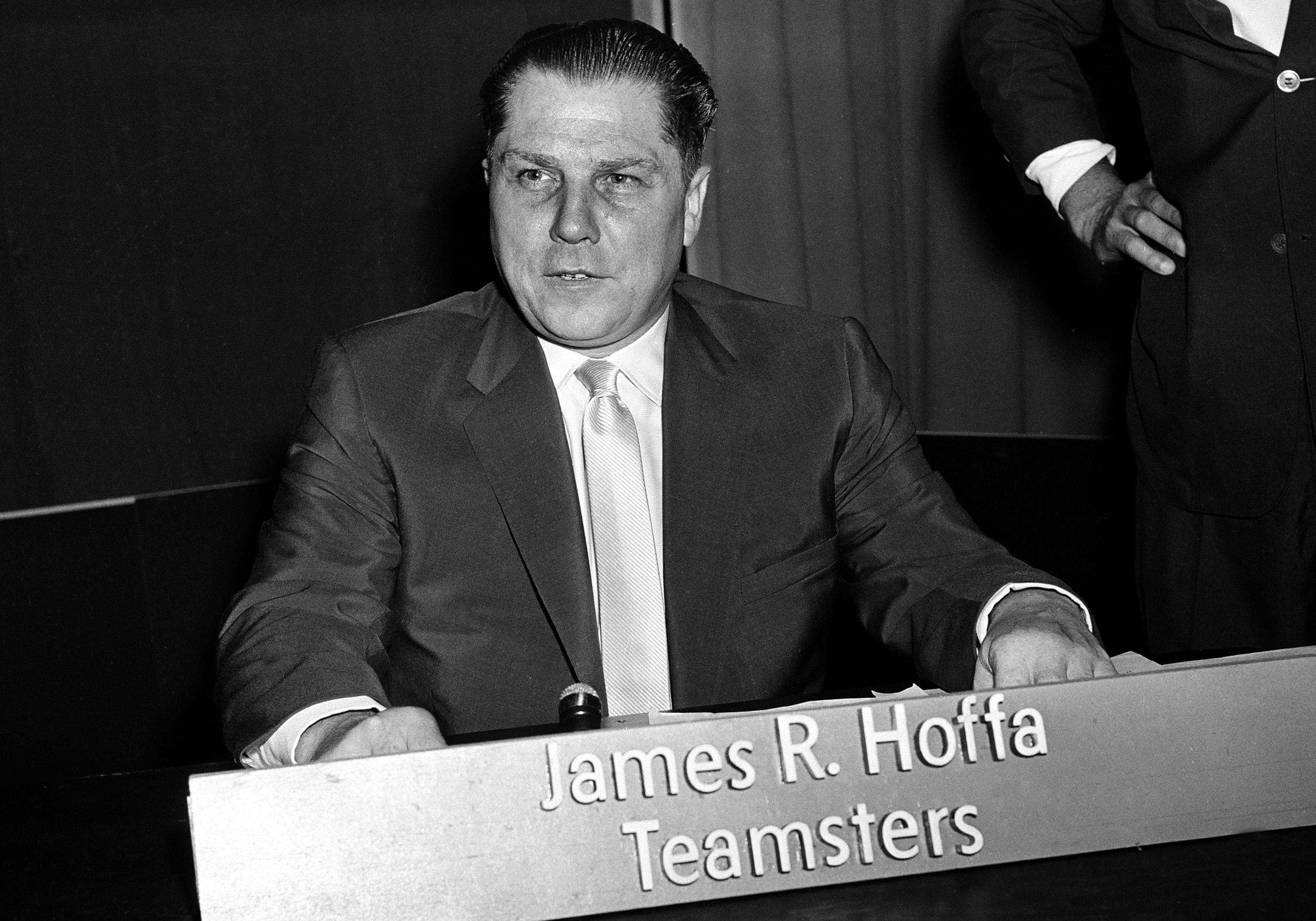This post contains spoilers for The Irishman.
One of the most important scenes in The Irishman takes place in Chicago — and unlike most of the movie, it actually happened.
In the early 1960s, Teamsters president Jimmy Hoffa was having a little trouble with a rival union luring away cabdrivers here. He needed some muscle to keep the cabbies in line. So, according to the film, Hoffa called Pennsylvania mob boss Russell Bufalino, the cousin of his personal attorney. Bufalino knew just the guy: his hit man, Frank Sheeran.
“I heard you paint houses,” Hoffa, played by Al Pacino, says to Sheeran, played by Robert DeNiro — meaning he’s heard that Sheeran does hits at victims' homes.
“Yes sir, I do,” Sheeran replies. “I also do my own carpentry” — meaning he cleans up the crime scenes.
The next day, Sheeran flies to Chicago, where he meets Teamsters local president and Outfit racketeer Joe Glimco in a Russian bathhouse. The problem, Glimco explains, is that the Seafarers Union is signing up cabbies. The Teamsters plan to retaliate by pushing their cabs into the Chicago River.
“[Hoffa] has Mayor fuckin’ Daley in his pocket,” Glimco boasts. “The cops are OK with whatever the fuck we do. They’re not gonna let us push these cars in, but they’re certainly not gonna let anyone fuckin’ stop us.”
That night, when Glimco complains that pushing cars into the river is too much work, Sheeran suggests using "candy," or explosives, to torch the rest of the cars. Hoffa is so impressed he takes Sheeran under his wing, beginning a long friendship that will end only when Sheeran shoots Hoffa in the head.
In reality, taxicabs did end up at the bottom of the Chicago River during a membership contest between the Teamsters and a rival union. But Teamsters lost the dispute, which was considered a major defeat for Hoffa and the Chicago Outfit.
Glimco, the president of Teamsters Local 777, which represented taxi and truck drivers, was known as Chicago’s No. 1 labor racketeer. According to a Chicago Tribune expose on his career, “Little Joey” got his start as “a slugger in the Poultry Handlers Union,” shaking down merchants in the Fulton Street Market. He was also an associate of Frank (the Enforcer) Nitti, who took over the Outfit when Al Capone went to prison. After muscling his way into control of the Chicago Federation of Labor through a campaign of bombings, shootings, and intimidation, Glimco took over the Teamsters local by threatening to kill the family of its president, Dominic Abata. Glimco himself became president, despite the fact that he had never driven a cab.
Glimco was taking in $70,000 a month from shakedowns and union dues, but he wasn’t taking care of his drivers, who complained that the local was nothing but a “collection agency” that dunned them $4 a month. A cabbie alleged that Glimco ordered Checker Cab to fire him after he tried to collect health and welfare benefits from the union. The National Labor Relations Board investigated. Disgruntled drivers for Yellow and Checker formed their own union, the Democratic Union Organizing Committee. It was led by Dominic Abata, Glimco’s old nemesis. The NLRB scheduled a membership election for July 20, 1961. (The Seafarers supported the new union, but were not trying to lure away cabbies themselves.)
The Teamsters spent $250,000 to fight the breakaway union. Hoffa personally came to Chicago to campaign for Glimco, accompanied by a massive bodyguard. (“Hoffa Sending His Sluggers to Aid Glimco,” the Tribune reported.) Sen. Paul Douglas endorsed the new union, while Olympic track star Jesse Owens cut a radio ad for the Teamsters.
The Teamsters eventually lost, 2,122-1,760. Attorney General Robert Kennedy, who had questioned Glimco before the Senate committee investigating the Teamsters' links to organized crime, was said to be “extremely pleased.” The director of the Chicago Crime Commission called the vote “just as much a blow to Jimmy Hoffa as it was to Glimco.”
But Glimco wasn't going to let his meal ticket go that easily. He tried to keep collecting dues from the cabdrivers, unsuccessfully. He petitioned the NLRB for a new election, successfully. During that second campaign, the Tribune reported that three Yellow cabs were found in the Chicago River in two days, just as depicted in The Irishman. A fourth cab was reported missing, and believed submerged. According to the Tribune, one cab was recovered from the south branch of the river, near Hoyne Avenue. Two more were “fished from a slip” near 1070 N. Branch St., after they'd been scraped by the hull of a concrete boat, flattening their roofs.
The Teamsters lost the second election, too. Jimmy Hoffa went to prison five years later, in 1967, for fraud and attempting to bribe a juror. His association with organized crime damaged the labor movement’s reputation, and contributed to the demise of unions.
Glimco never went to prison, but was never much of a force in the Outfit after losing the cabdrivers. He died in 1991, but his grandson, James, is now president of Teamsters Local 777. The Teamsters, after all, don't often forget their friends.





Comments are closed.